From the many female literary talents that Mexico has produced in the last few decades, the public eye has failed to acknowledge one of its greatest fiction talents — Fernanda Melchor. Melchor was born in Veracruz, where she also got her journalism degree before becoming a novelist. Although she has works published in prestigious journals like “The Paris Review” and has published four books, she had her first breakthrough with “Temporada de Huracanes” (2017), which was shortlisted for the International Booker Prize and won the Haus der Kulturen der Welt.
In her most recent novel, “Páradais” (2021), (an onomatopoeia of how ‘Paradise’ is pronounced in Spanish), Melchor continues her exploration of the characteristics of her background and Mexican contemporary culture. In this text, she focuses on the phenomenon of gated communities. Although there are gated communities almost anywhere in the world, they have a very specific connotation in Latin America since they are effectively a privileged fragment from another world. Gated communities normally are extremely protected, wealthy and elitist societies on the outskirts of large and troubled cities. In many cases, these gated communities are the only places in developing countries that have reliable services and amenities that in the rest of the world are deemed as basic. Additionally, gated communities also employ a large number of domestic service workers, which effectively creates internal factions. The owners and the workers. The rich and the poor. The gringos and the Mexicans. Both coexisting in the same place.
Melchor explores this phenomenon with a novel that follows the interactions between two teenagers of opposite backgrounds within the gated community Páradais. Franco, a teenager that lives in Páradais and comes from an extremely wealthy family, struggles with his personal image and has an addiction to porn. Polo comes from a poor family outside and is working as a gardener in Páradais after flunking out of school. Franco and Polo start to hang out together one night after Franco offers Polo some alcohol in exchange for a cigarette. After that, they start meeting regularly to get blasted drunk and talk about their lives. With these conversations, Melchor is able to cut deep into the institutional injustices and differences between the classes in Mexico and in undeveloped countries. As the book continues, we see each teen running into terrible predicaments because they are not able to control their sexual desires, an interesting vehicle to lead the reader into reflecting on what makes us human and how class and background can or cannot affect that.
The construction of an impeccable and startling plot is not all that Melchor excels at in “Páradais.” The novel is a prime example of her mastery of Spanish prose all while stretching conventional storytelling techniques. Although the narrator of the text is omniscient, they still talk in a rather personal manner with slang, losing themself in tangents and emanating feelings. The latter allows Melchor to force onto the reader an almost addicting stream of consciousness that fuels the conversation on hierarchies she wants to start. It’s this prose that allows Melchor to play with opposites and generate a disturbing and almost macabre story that asks us to rethink our own positions in the world.
“Polo trató de pronunciar esa gringada. Se dice Páradais, no Paradise; a ver, repítelo: Páradais. Y el nuevo empleado tuvo ganas de responderle: Páradais la puta que te parió.”






